Augustana Theater Professor Pays Homage to Broadway Golden Age in One-Woman Show
Shelley Cooper grew up glued to the Golden Age of Broadway (roughly between 1930 and 1960), and many of those shining shows were ruled by two towering female talents – Mary Martin and Ethel Merman.
The lives and songs of Martin (1913-1990) — vulnerable, dainty, and lovely – and Merman (1908-1984) — brassy, unapologetic, and bold, will be highlighted in a new one-woman show by Cooper, a 34-year-old musical theater professor at Augustana College.
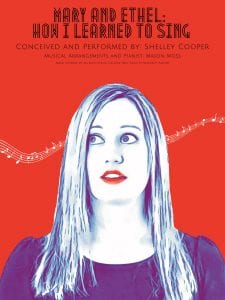 “Mary and Ethel: How I Learned to Sing” will include new medleys arranged by Quad-City music director, Mason Moss, in two shows at 7 p.m. Sept. 12 (sold out) and Sept. 19 at Circa ‘21’s Speakeasy, 1818 3rd Ave., Rock Island. These women inspired some of the greatest composers, such as George and Ira Gershwin, Cole Porter, Richard Rodgers, Oscar Hammerstein II, Irving Berlin, Jule Styne, Jerry Herman, Kurt Weill and more.
“Mary and Ethel: How I Learned to Sing” will include new medleys arranged by Quad-City music director, Mason Moss, in two shows at 7 p.m. Sept. 12 (sold out) and Sept. 19 at Circa ‘21’s Speakeasy, 1818 3rd Ave., Rock Island. These women inspired some of the greatest composers, such as George and Ira Gershwin, Cole Porter, Richard Rodgers, Oscar Hammerstein II, Irving Berlin, Jule Styne, Jerry Herman, Kurt Weill and more.
Cooper’s show will feature songs from the hit shows “Anything Goes,” “Hello, Dolly,” “The Sound of Music,” “South Pacific,” “Annie Get Your Gun,” “Peter Pan,” and more. The program is divided into halves – the first half highlighting Martin and second half Merman, with a combination of medleys and stand-alone songs.
“This is how I learned to sing,” Cooper said in a recent interview. “I tell my students, I didn’t learn how to sing through the 26 Italian art songs. I learned how to sing with Rodgers & Hammerstein, with Cole Porter and George Gershwin and Irving Berlin. It was listening to recordings of Mary Martin, Julie Andrews, Judy Garland, Ethel Merman and all of these gems.
“The roles I wanted to play, I wanted to either be Mary Martin or I wanted to be an Ethel Merman,” she said. “I loved both of them.”
“I love the genuine and nuanced performances that Mary Martin brought,” Cooper said. “I just thought she was always very authentic on stage, nothing ever forced or pushed. Just a really delightful person to watch.”
“There was always such an elegance and poise to her, and it makes sense, looking at the roles she played,” Cooper said. “Where Ethel – I love how unapologetic she was. I love that she never took a voice lesson and George Gershwin told her not to. He didn’t want anyone to mess with the natural talent she had. She had this natural gift, and she didn’t overthink anything.”
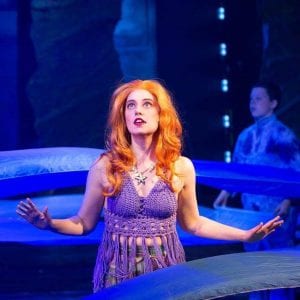
Shelley Cooper as Ariel in “The Little Mermaid” in 2016.
“They asked her on the first night of ‘Annie Get Your Gun,’ was she nervous, and she said, ‘No, I know my lines, I know my blocking. I’ll be fine’,” she said. “She walked out there and made Broadway history; it was phenomenal. There’s something really bold and gutsy about that. She was always a straight shooter and told people like it was. I admire that actually quite a bit about her, and how her voice for the time, there wasn’t anything like that before.”
Both Mary and Ethel made their Broadway debuts – not in lead roles — with one song, and each became an overnight success – Merman with “I Got Rhythm” (from 1930’s “Girl Crazy”) and Martin with “My Heart Belongs to Daddy” (from 1938’s “Leave It To Me”).
“They who were the audience were talking about when they were leaving the theater,” Cooper said.
“I think it’s especially poignant now, since a lot of this music was written during the Great Depression era, and it was there to lift people’s spirits,” she said, drawing a parallel to today. “I’m hoping it will have the same effect now. For me it has, working on this music, especially working on an ‘Anything Goes’ medley.”
Cooper (a powerful multi-hyphenate who sings, teaches, dances, choreographs and directs) most adores “Annie Get Your Gun,” Berlin’s 1946 landmark show penned for Merman as Annie Oakley, especially the poignant ballads “They Say It’s Wonderful” and “I Got Lost in His Arms.”
“Oh my gosh, just brilliant,” she said. “The ‘Sound of Music’ medley is so sentimental to me, because the songs I included in that were all my audition songs, so going back and singing them now – as someone who’s had a career and is trained – versus 13 years old, that’s really special.”
From Kentucky to traveling the world
The extroverted native of Louisville, Ky., came to the Q-C in late 2017 as an assistant professor of theater arts, heading the private college’s new musical-theater concentration.
“I would say that what the musical-theater concentration does is open doors to having skills in multiple areas — and that’s what’s kept me employed since I graduated,” Cooper, who earned a B.A. in theater from Hanover College in southern Indiana, said in December 2017.
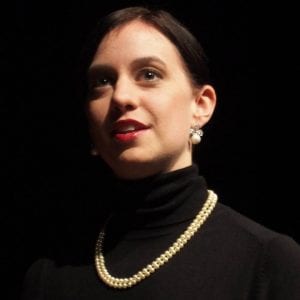
Cooper as Maria Callas in “La Divina.”
With a master’s in musical theater from University of Central Florida, Shelley has performed all over the world for many companies, such as the Orlando Philharmonic Orchestra, Walt Disney World, Universal Studios, Monroe Symphony, Chicago Summer Opera, Opera Quad Cities, Orlando Repertory Theatre, Shawnee Summer Theatre, Redhouse Arts Center, Varna Opera Theatre, Bangkok Theatre Festival, and the Simbiose Produções (MOVE Studio) in São Paulo, Brazil and the Venetian Macao in Macau, China.
Her most noted performances are Johanna in “Sweeney Todd” (starring Tony-winning actress, Faith Prince), Nellie in “South Pacific,” Cinderella in “Into the Woods,” Ariel in “The Little Mermaid,” Armida in “Rinaldo,” Edith in “Pirates of Penzance,” Berta in “The Barber of Seville” at the Varna Opera Theatre in Bulgaria, and the soprano soloist in Handel’s “Messiah” with Bangkok International Orchestra.
Her original one-woman show, “La Divina: The Last Interview of Maria Callas” has been performed on three continents.
As the 2016 star of “The Little Mermaid” in Syracuse, N.Y., a review at Syracuse.com said Cooper’s voice “rivals the Ariel familiar to us from the Disney movie. Her vocals jump from tender to powerful, wistful to funny with equal assurance. Big and bright, highly emotive, she’s clearly played much larger venues.
“Her performance is reminiscent of vintage Lucille Ball slapstick as she contorts her face to make Ariel’s nervousness and awkwardness apparent,” the review said. “When she finally plays it straight in the plaintive ‘If Only,’ we witness the heart-tugging grace and vulnerability she’s capable of.”
Cooper said she got the bug for seeing the world when she was 21 in college, and went overseas for the first time on a Mozart choir tour of Austria. Together with other college choirs, she sang in Salzburg and Vienna. “That trip really planted the seed to really love traveling,” she said. At Hanover, she was a theater major and voice minor.
“It became really sentimental and special, as the first trip I took my students on was this very first trip I took as a student abroad,” Cooper said of her first Augie “J-term” (under the new semester schedule) this past January.
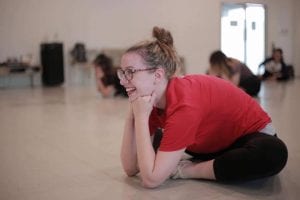
Cooper teaching a musical theater intensive in Thailand in 2017.
Last fall semester, she was on sabbatical, in Bulgaria for “Barber of Seville” and planning her January 2020 trip with students to Austria, visiting Vienna. She took 14 students for two and a half weeks – including a workshop held by the International University Global Theater Experience. Cooper has worked with them four years and gone to conferences.
“It’s a melting pot of many different cultures,” she said. “Sometimes, I’m the only American there; it can be 7 to 12 to 15 countries represented. I wanted my students to learn, not only physical theater from someone who studied it, but also to be surrounded by many different cultures and ideas, while also getting to experience Austria – which is a cultural mecca in and of itself.”
“I originally planned to go in January 2021, and man, am I happy I decided to go for 2020,” Cooper said.
Cooper’s favorite overseas performing experience was Bulgaria, with a cast of people from Mexico, Poland, Russia, Greece, Spain and Italy. A choirmaster was from Korea and the director from the Czech Republic.
“I was the only American in my cast and I loved that experience,” she said. “Varna, Bulgaria is a beautiful town. Every day after rehearsal, I could walk to the beach. But the people and artists I met from all over the world, it was such an amazing experience. Having a lot of rehearsals which were in Italian, and me trying to figure my way through it, I enjoyed the challenge.”

Copper singing with a jazz band in Bangkok, Thailand in 2014.
A former voice teacher (from Hanover) is from Bulgaria and she asked if she could play the part, offered as a last-minute replacement last September. Cooper said the 1816 Rossini opera is her favorite of all operas.
“It’s so good. It’s so entertaining; it’s funny. The music is upbeat; I think the piece moves really well,” she said. Michelle Crouch, who teaches opera at Augustana, said it best, Cooper recalled – “She said Rossini is the Champagne of opera. I totally agree; it’s light, it’s fun, it’s smart. I just find the music so beautiful, but also it’s funny, and it’s so fun to be in.”
Her role, Berta, is the old maid who is smarter than everyone on stage. “I am the person that’s the eyes and ears of the operation and I notice all of the little stupid things that all of my rich predecessors are doing,” Cooper said. “I have this big aria where I am making of fun of old men chasing after young women – why do people do this? It’s ridiculous, they’re making fools of themselves. Timely, huh?”
Crooning Maria, to Mary and Ethel
“La Divina” is a one-woman show written and performed by Cooper, in which she becomes the dramatic 20th-century opera singer Maria Callas (1923-1977). The hour-long show contains stories of Callas’ life and famous iconic arias that she was best known for singing.
It premiered at the Orlando Repertory Theatre Black Box Space in October 2010, later performed at the International Performing Arts Institute in Bavaria, Germany, Bangkok Theatre Festival, and KAD Theatre in Chiangmai, Thailand.
Cooper has performed it at Augustana College and at the Retzhof Castle in Graz, Austria as a part of the International Global Theatre Experience.
She wrote her 2010 master’s thesis on Callas, whom Cooper wrote “stressed the importance of understanding and interpreting text and music with precision, detail, specifics and artistry. Her techniques set the standard for future aspiring singer/actors.” In the 1970s, Callas lost her ability to sing, so she conducted Master Classes at the Juilliard School of Music, which inspired Tony winning playwright Terrence McNally’s biographical play, “Master Class.”
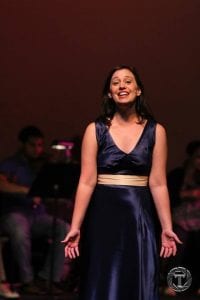
Cooper performing “South Pacific” with the Monroe Symphony in 2015.
Unlike Cooper’s Callas show, for “Mary and Ethel,” she’s not impersonating Merman and Martin. This time, it’s Cooper paying homage to the women and talking about their lives and material, and how they influenced her career. Like “La Divina,” she also hopes “Mary and Ethel” has a long life.
The only time she played one of their famous parts was a staged concert version of “South Pacific” in 2015 with the Monroe Symphony in Louisiana, playing Martin’s lead role of Nellie. You can hear Cooper sing “A Cockeyed Optimist” from that show, on her new website, shelley-cooper.com.
Both Mary and Ethel were up for Best Leading Actress at the 1960 Tony Awards and Martin (as Maria in “The Sound of Music”) won it over Merman, as “Gypsy” was shut out from any awards, with “Sound of Music” winning five. Martin earned two other Tonys for “South Pacific” and “Peter Pan,” and Merman won one in 1951 for “Call Me Madam.”
“They were friends. That’s the really cool part,” Cooper said. The women did a New York concert together on June 15, 1953.
“What’s interesting too, the last medley is from ‘Hello Dolly,’ written for Ethel Merman, but it was Mary Martin who gave it international acclaim,” she said. “They both played the role, and there’s this amazing picture I found of the two of them together on stage in the bright red Dolly outfit and the red feather headdress.” That was from a one-night-
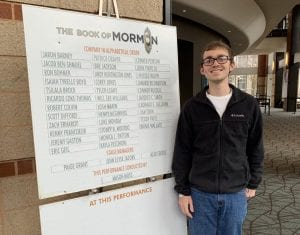
Pianist Mason Moss at the Peace Center, Greenville, S.C., before conducting “The Book of Mormon” in March 2019.
only Broadway concert in 1977.
Martin also played in “Annie Get Your Gun” on tour. “The show was written for Ethel, but Mary played the role,” Cooper said.
Cooper got a new faculty grant from Augustana to pay Moss, who has accompanied and conducted a national tour of “Book of Mormon,” and music directed at Quad City Music Guild.
“I cannot rave about him enough,” she said.
Changing plans during Covid
This past spring, Cooper had to cancel directing the musical “American Idiot” (based on the Green Day album), and they’re not sure when and if it will be back.
“I would love to do it, because we had learned all of the music, the students were really excited about doing that show,” she said. “I was really excited to try my hand at directing something like that; for it to get canceled, it was heartbreaking, of course. Not as much for me, but way more for the students.”
“It’s up in the air right now,” she said. “We were going to be doing ‘Into the Woods’ in the fall, but I moved that to February to buy us some time.”
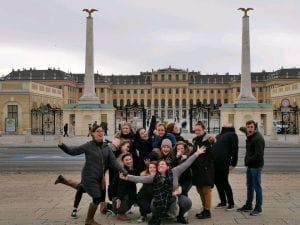
Cooper with a group of Augustana students at Schonbrunn Palace, Vienna, in January 2020.
They’re planning to do that show in Centennial Hall, to distance better (with a smaller cast) and have a student orchestra led by Daniel Chetel, with Michelle Crouch as music director.
Shelley is an accomplished director/choreographer specializing in musicals, and some of her favorite credits include “The Drowsy Chaperone,” “Big River,” “How to Succeed in Business Without Really Trying,” “The Light in the Piazza,” “Company,” “Elegies for Angels, Punks and Raging Queens” and “Dames at Sea.”
She has former students working around the world, including the Broadway production of “Holiday Inn,” NBC’s “Hairspray Live,” “The Festival of the Lion King” in Hong Kong, national tours of “Rock of Ages,” “Wizard of Oz,” “Flashdance,” “Beauty and the Beast” and the West End revival of “Miss Saigon.”
Over the past six months, Cooper has taught mostly online, including 567 Broadway, which she started at the end of the spring semester. Run by Broadway dancer and choreographer Joseph Corella, “It’s dance, but it’s also cardio and stamina-inducing, so it’s for really helping with the whole performance package,” she said.
“The stamina that it takes to do that is equal to an Act 1 of a high-energy musical,” Cooper said. “The idea is that all body types, everyone is welcome to that kind of community.”
She’s mainly doing it as part of jazz dance classes at Augustana, sessions via Zoom, as well as voice lessons. “Parts of it have gotten better online than in-person, because I’m able to focus on mouth shapes, the jaw and all those things involved with singing, because that’s all I can really see in the frame” Cooper said of teaching voice online.
Her students are from across the country, ranging from 12 to mid-20s, as well as some older adults, focusing on musical theater.
At Augie, Cooper teaches two classes in jazz and one in tap. “We’re getting by and we’re making it work. I have my classes in smaller groups and we’re meeting for shorter periods of time in person, with masks,” she said. “If my class is eight students, I have four students meet for 40 minutes and another day, four will meet for 40 minutes.”
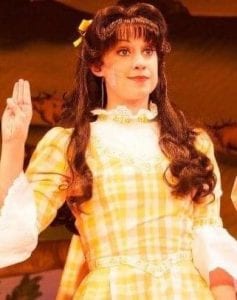
Cooper performing at Disney World’s Hoop-De-Doo Revue.
The largest class she has at a time is six. “To be honest, the students are loving the small class size. So if any good comes from this, it’s that,” she said. “The students are loving the amount of attention and the space. I have found that to be wonderful, so the small groups might actually stay.”
They meet in the carriage house across from PepsiCo Center, that has lots of mirrors and a sound system.
Cooper has some distance learners, who Zoom into class and she follows up with them. “We didn’t cancel any of the classes,” she said.
She recently performed in front of an audience for the first time in nine months in August at Circa ‘21’s second “Music on the Marquee,” where Cooper sang a “Sound of Music” medley and a “Girl Crazy” combo of “But Not for Me” and “I Got Rhythm.” That was her first time working with Circa, and had not sung in public since last November, at Meredith College in Raleigh, N.C.
“It was so exciting,” Cooper said of the outdoor marquee concert. “At the end of it all, I was on cloud nine. The next day, I woke up just on this high of happiness.”
“Leading up to it, I was really nervous,” she said. “But once I got into it, it was like an old hat. This is so much fun and I felt like I enjoyed it so much more than I had ever, because I haven’t been able to do it. It was teaching me not to take those performing moments for granted.”
During the pandemic, people have intensely sought and connected with entertainment in all forms.
“It says how important our work really is, and how universal the work is,” Cooper said. “People just cling to it in times for comfort, but also for inspiration. Throughout all of this, watching artists getting knocked down, knocked down – it shows the pure resilience. We’ve always been a resilient people, but my goodness, even more so right now.”
Because of the Phase 4 rules of Restore Illinois, capacity for the Speakeasy is limited to only 50 people. They do temperature checks at the door; masks are required, and patrons must sit with people they know. For tickets ($20 in advance, $25 day of), call 309-786-7733, ext. 2, or visit thecirca21speakeasy.com.




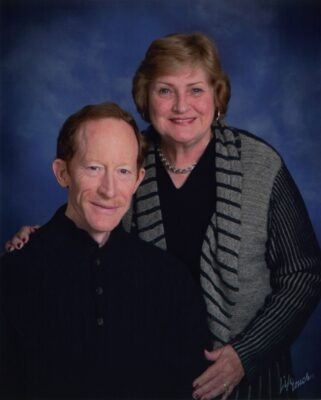








Leave a Reply
You must be logged in to post a comment.